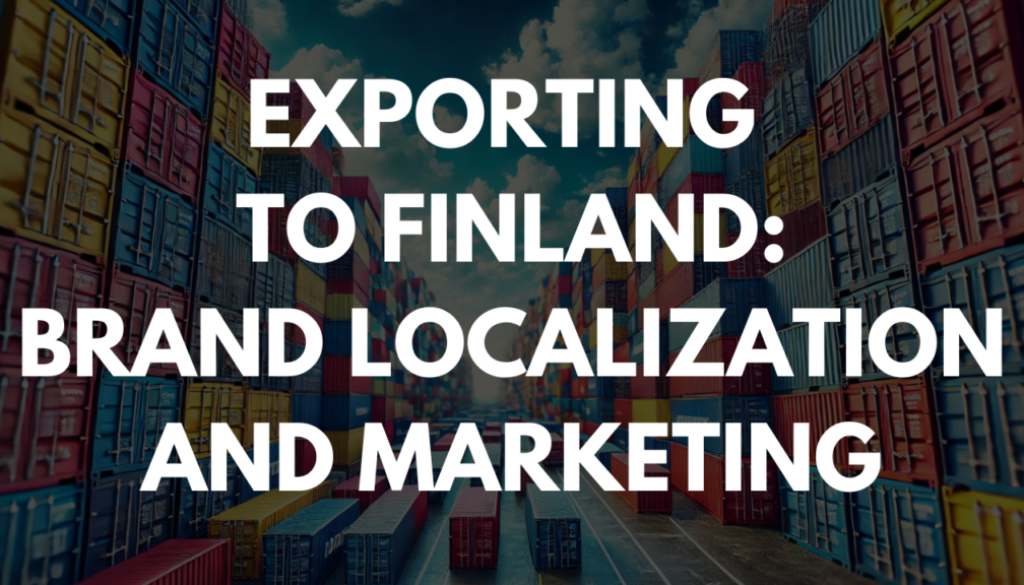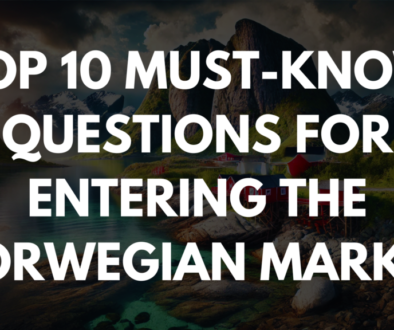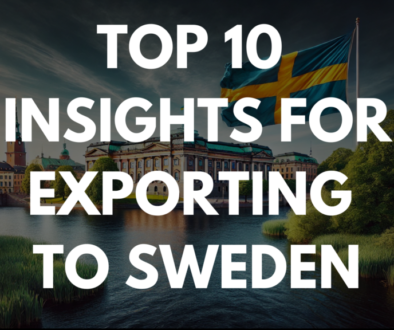Exporting to Finland: Brand Localization and Marketing
In today’s increasingly interconnected global market, understanding cultural nuances is critical for businesses looking to expand their operations internationally
When exporting to Finland, recognizing the unique cultural characteristics of the Finnish market can be the difference between success and failure. Recently, I had the opportunity to speak with Simon, a seasoned British marketing expert who has been living and working in Finland for many years
He shared his valuable insights into Finnish localization, emphasizing the importance of sustainability and tailored approaches in Finland marketing to successfully navigate the region’s business culture.
From Wales to Finland: A Career Shaped by Global Opportunities
Simon’s journey to Finland is as fascinating as it is instructive for anyone looking to expand their business horizons, particularly those considering exporting to Finland or entering the Finnish market.
Born and raised in Wales, Simon began his career in the video gaming industry in the UK. His expertise and passion for marketing led him to move to California in the early 2000s, where he continued to build his career in one of the most dynamic markets in the world. However, a significant turn in his career came when Nokia, then one of the world’s leading brands, approached him with an offer to help expand their gaming division. Nokia, a company deeply ingrained in Finnish culture, was eager to leverage Simon’s expertise to strengthen its global presence in gaming.
This opportunity led Simon to Helsinki, marking the beginning of his long and fruitful relationship with Finland.
The move from the sunny, fast-paced lifestyle of Los Angeles to the cooler, more reserved atmosphere of Helsinki was undoubtedly a culture shock. However, Simon quickly adapted and grew to appreciate the unique qualities that Finland offered. His role required him to master Finnish localization, ensuring products and marketing strategies resonated deeply with local audiences while maintaining global appeal.
His experience working with Nokia not only allowed him to witness the inner workings of one of the world’s most innovative companies but also equipped him with invaluable insights into Finland marketing and the intricate details of localization within the Finnish market.
Embracing the Finnish Way: Integrity, Balance, and Efficiency
One of the most striking aspects of Finnish culture that Simon encountered was the deep-rooted sense of integrity and honesty.
Finnish people, both in their personal and professional lives, value transparency and straightforwardness. This cultural trait extends into the workplace, where Finns are known for their strong work ethic, reliability, and no-nonsense approach to getting things done. In contrast to the often fast-paced and relentless work environments found in places like California or even London, Finland places a strong emphasis on work-life balance.
In Finnish companies, it is not uncommon for employees to prioritize personal commitments, such as picking up their children from school, even if it means leaving work unfinished.
This level of respect for personal time is a testament to the Finnish value system, which prioritizes the well-being of individuals alongside professional responsibilities. However, this doesn’t mean that Finns are any less committed to their work. On the contrary, the efficiency with which they operate allows them to maintain high levels of productivity without sacrificing personal time.
Simon noted that this approach was a significant adjustment for him, particularly coming from environments where the expectation was to work until the job was done, regardless of personal commitments.
Another cultural aspect that Simon had to adapt to was the Finnish communication style. Unlike the British, who often use pleasantries and indirect language, Finns prefer to be direct and to the point. This can sometimes come across as blunt or even rude to those not familiar with the culture.
However, it is simply a reflection of the Finnish desire to communicate clearly and efficiently without wasting time on unnecessary formalities.

Finnish Business Etiquette: Navigating Humility and Respect
For businesses looking to enter the Finnish market, understanding and respecting Finnish cultural norms is crucial.
Finns are known for their humility and often approach both life and business with a sense of modesty. This humility, combined with a strong sense of integrity, means that Finns appreciate sincerity and transparency in their business dealings. Simon emphasized the importance of being genuine when interacting with Finnish businesses. While it may be tempting for companies to present themselves in a bold or flashy manner, this approach is unlikely to resonate with the Finnish audience.
Instead, companies should focus on delivering on their promises and ensuring that their products or services meet the high standards expected by Finnish consumers.
Another key point Simon raised was the importance of patience. Finns are generally reserved and may take time to warm up to new business relationships. It’s essential not to mistake this reserve for disinterest. Building trust with Finnish partners requires time and consistency.
Businesses should be prepared for a gradual process of relationship building, where actions speak louder than words.
In terms of networking and establishing connections, Simon pointed out that Finns value substance over form. It’s less about who you know and more about what you bring to the table. Networking events in Finland may not have the same level of small talk or socializing that is common in other cultures.
Instead, they are more focused on the exchange of meaningful ideas and business opportunities.
The Challenge of Language: Finnish and the Business Environment
The Finnish language is notoriously difficult to learn, ranking among the most challenging languages in the world.
Its complex grammar and vocabulary can be daunting for non-native speakers. Despite this, Simon noted that the vast majority of Finns, especially those involved in business, speak excellent English. This is particularly true for younger generations, who are often fluent in English and other languages.
However, for businesses looking to establish a strong presence in Finland, it is still important to consider localizing their materials.
Having a Finnish website, for instance, can be a significant advantage.
Not only does this show respect for the local culture, but it also improves search engine optimization (SEO) and ensures that the company’s message is effectively communicated to the Finnish audience.
Simon also highlighted the importance of going beyond simple translation. Effective localization involves adapting content to ensure it resonates with the target audience. This might involve adjusting the tone, style, and even the imagery used in marketing materials.
In Finland, where communication is often direct and straightforward, businesses should aim for simplicity and clarity in their messaging.
For those who decide to take on the challenge of learning Finnish, even a basic understanding of the language can go a long way in building rapport with local partners. Finns appreciate the effort, even if it’s just learning a few key phrases.
It demonstrates a commitment to understanding and respecting their culture, which can help in establishing stronger business relationships.
Digital Marketing in Finland: Strategies for Success
When it comes to digital marketing, Simon emphasized that while the fundamentals remain consistent across the globe, the approach should be tailored to fit local preferences and cultural nuances.
In Finland, simplicity and elegance are key characteristics that resonate with consumers. The broader Scandinavian aesthetic, known for its minimalist and functional design, is highly valued in Finland. Finnish consumers appreciate websites and marketing materials that are uncluttered and straightforward.
This preference aligns with the Finnish cultural value of efficiency—everything should serve a purpose, and unnecessary elements are often seen as a distraction.
Therefore, companies looking to succeed in Finland should focus on creating digital content that is not only visually appealing but also highly functional. Simon provided examples of global brands like Coca-Cola and Nike, which maintain a consistent brand identity worldwide while still adapting to local markets. This balance of global consistency and local relevance is crucial for businesses aiming to enter the Finnish market.
For instance, while the overall design and messaging might remain consistent, the language, imagery, and even the channels used for digital marketing should be adapted to suit Finnish preferences.
Moreover, Simon pointed out that the channels used for digital marketing can vary significantly between markets. While some countries might favor certain social media platforms or types of content, the preferences in Finland could be different.
Understanding these local preferences and adjusting the marketing strategy accordingly is essential for success.
In terms of content, Finns tend to prefer concise and to-the-point messaging, especially in the digital space. While long-form content might be popular in certain Asian markets, Finnish consumers generally appreciate brevity and clarity.
This means that companies should focus on delivering their message quickly and efficiently, without overwhelming the audience with too much information.
Sustainability in Finland: A Core Value, Not Just a Trend
Sustainability is more than just a buzzword in Finland—it’s a deeply ingrained part of the culture.
The Finnish relationship with nature is one of respect and stewardship, a value that has been passed down through generations. Finland boasts some of the cleanest air and water in the world, and these natural resources are seen as national treasures that must be protected. Simon explained that sustainability is not just an expectation in Finland;
it’s almost a given. Companies operating in Finland are expected to conduct their business in a way that respects the environment.
This expectation extends to all aspects of a company’s operations, from the sourcing of materials to the disposal of waste. For businesses looking to enter the Finnish market, it’s important to align with these values. While you don’t necessarily need to center your marketing around sustainability, it should be an integral part of your business practices.
Finns are well-informed consumers, and they are likely to notice if a company’s actions don’t match its words.
Simon cited the example of Finnair, which has been recognized as one of the world’s most sustainable airlines. This recognition is not just about meeting regulatory requirements; it reflects a deeper commitment to environmental responsibility that resonates with Finnish values.
In Finland, sustainability is not just about being “green” in the marketing sense. It’s about demonstrating a genuine commitment to preserving the natural environment.
This could mean reducing carbon emissions, using sustainable materials, or ensuring that production processes minimize environmental impact.
For Finnish consumers, these actions speak louder than any marketing campaign.
Moreover, companies should be prepared to provide detailed information about their sustainability practices, especially if they are working with Finnish partners or clients. Simon noted that while there may not be as much regulatory pressure as in some other European countries, the expectation is that companies will be transparent about their environmental impact.
Having clear and accurate documentation of your sustainability practices is essential.

The Nordic Appeal: Why Finland is a Strategic Market
The Nordic region, which includes Finland, Sweden, Norway, Denmark, and Iceland, may not have the large populations of markets like Germany or the UK, but it offers significant advantages for businesses looking to expand.
Finland, in particular, presents a stable, high-income market with a strong appreciation for quality and innovation. One of the key advantages of the Finnish market is its wealth. Despite its relatively small population, Finland has a high level of disposable income, making it an attractive market for companies offering premium products and services.
Additionally, Finland’s business environment is known for its transparency and efficiency.
Regulations are clear and consistent, making it easier for businesses to operate without unexpected hurdles. Another advantage is Finland’s excellent infrastructure and transport links. Despite its geographical location in the far north of Europe, Finland is well-connected both within the Nordic region and internationally.
This makes it an ideal base for companies looking to expand into other parts of Europe or even into Asia.
Simon also pointed out that Finland’s membership in the European Union (EU) provides additional benefits for businesses. As part of the EU, Finland adheres to common regulations and standards, making it easier for companies to operate across multiple European markets. While Finland does have its own currency, the euro, this is more of a practical consideration than a barrier to trade.
Moreover, Finland’s commitment to innovation and technology makes it a forward-thinking market.
The country has a strong focus on education, research, and development, which has resulted in a highly skilled workforce. For companies in industries such as technology, healthcare, and engineering, Finland offers access to some of the best talent in the world. In addition to these practical advantages, Finland also offers a unique cultural appeal.
The Nordic lifestyle, characterized by a strong connection to nature, a focus on well-being, and a commitment to sustainability, resonates with consumers around the world.
Companies that can align their brand with these values are likely to find a receptive audience in Finland.
Partnering for Success: How Simon Helps Companies Navigate Global Markets
Simon’s extensive experience in global marketing, combined with his deep understanding of Finnish culture, makes him a valuable partner for companies looking to expand into Finland.
As a representative of UP There, Everywhere—a global virtual creative agency—Simon specializes in helping businesses navigate the complexities of international markets. One of the first steps Simon recommends for companies is to conduct a thorough audit of their current marketing efforts. This involves evaluating what’s working, what’s not, and where there might be opportunities for improvement.
An audit can provide valuable insights into how a company is perceived in the market and what changes might be needed to better connect with the Finnish audience.
Simon’s approach is practical and tailored to the needs of each client. Rather than pushing for a complete overhaul of a company’s marketing strategy, he focuses on making targeted improvements that can deliver significant results. This might involve tweaking a website to improve user engagement, adjusting the tone of communication to better align with Finnish preferences, or developing a more effective digital marketing strategy.
For companies with limited budgets, Simon offers scalable solutions that build on each other.
Starting with a basic audit, companies can gradually implement changes as their resources allow. This flexible approach ensures that even smaller companies can benefit from professional marketing support without being overwhelmed by costs. Simon’s global network is another key asset for companies looking to expand internationally.
With team members located in major markets around the world, UP There, Everywhere offers a truly global perspective while maintaining a strong local presence in Finland.
This combination of global reach and local expertise allows Simon and his team to provide clients with the best of both worlds. In addition to his marketing expertise, Simon’s deep understanding of Finnish culture enables him to provide valuable insights into how to approach the Finnish market.
Whether it’s navigating the complexities of Finnish business etiquette, understanding the importance of sustainability, or tailoring digital marketing strategies to local preferences, Simon’s guidance can make a significant difference in a company’s success.
Conclusion: The Value of Cultural Understanding in Global Business
Expanding into a new market is always a challenge, but with the right approach, it can also be incredibly rewarding.
Finland, with its unique blend of cultural values, strong economy, and commitment to sustainability, offers significant opportunities for businesses willing to invest the time and effort to understand the market. Simon’s insights into Finnish business culture provide a valuable roadmap for companies looking to enter this market. From understanding the importance of humility and integrity to navigating the challenges of language and digital marketing, his advice offers a comprehensive guide to succeeding in Finland.
For businesses considering expansion into Finland or other international markets, partnering with experts like Simon can provide the support and guidance needed to navigate the complexities of global business.
By combining local knowledge with global expertise, companies can position themselves for success in the increasingly interconnected world of international trade. If you’re looking to expand your business into Finland or other global markets, Simon and his team at UP There, Everywhere are ready to help. With a focus on practical solutions, cultural understanding, and long-term partnerships, they can provide the insights and support you need to achieve your goals.
Whether you’re just starting out or looking to take your business to the next level, understanding and respecting the local culture is key to success.
With the right approach and the right partners, you can navigate the challenges of international expansion and build a thriving business in any market.




